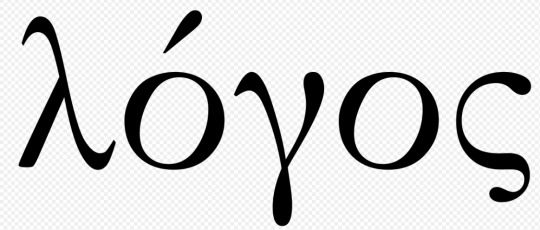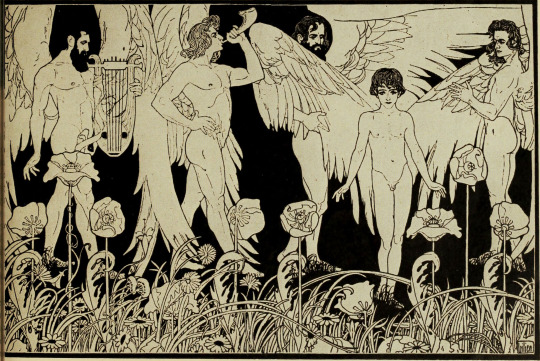#bereshit bara elohim
Explore tagged Tumblr posts
Text
What Does Genesis 1:1 Mean?
Genesis 1:1 is one of those really tricky plays on words that doesn't translate well into English. Let's play with the metaphysics a bit while learning why quantum theorists reject spiritualist wuwu. Rock with me as we take the journey within.
In the beginning, God created the heavens and the earth. -Genesis 1:1 Seems pretty straight forward right? Well, having recently learned how to read Hebrew I’d say it’s anything but straight forward. The syntax is incredibly elusive and doesn’t really translate into English very well. In fact, Genesis 1:1 was quite the point of contention as the scholars responsible for the Septuagint came…

View On WordPress
#bereshit bara elohim#bible study#christianity#creation#divine emanation#esoteric#genesis 1:1#god doesn&039;t fit inside a box#hebrew study#in the beginning#kabbalah#metaphysics#moshe#quantum theory#spiritual growth#spirituality#tanakh#we don&039;t know
8 notes
·
View notes
Text
A link to my personal reading of the Scriptures
for the 25th of October 2024 with a paired chapter from each Testament (the First & the New Covenant) of the Bible
[The Book of Mark, Chapter 5 • The Book of 1st Samuel, Chapter 1]
along with Today’s reading from the ancient books of Proverbs and Psalms with Proverbs 25 and Psalm 25 coinciding with the day of the month, accompanied by Psalm 34 for the 34th day of Astronomical Autumn, and Psalm 149 for day 299 of the year (with the consummate book of 150 Psalms in its 2nd revolution this year)
A post by John Parsons:
The fall holidays are always a whirlwind of activity. First there is Rosh Hashanah, followed by the ten "Days of Awe" leading up to Yom Kippur, and then comes the week-long holiday of Sukkot (Tabernacles) that is immediately followed by the holiday of "Simchat Torah" when we read the very last Torah portion and rewind the scroll to begin reading again for the new year — and all that happens during the first few weeks of the month! Woah!
The Sabbath that follows Simchat Torah is called "Shabbat Bereshit" when we are finally able to slow down a bit and begin (re)reading the very first portion of the Bible...
====
In Jewish tradition, the word “Bereshit” can refer to either the first Torah portion of the Bible (i.e., Gen. 1:1-6:8) or to the first book of the Torah itself. When it is used to refer to the Torah portion, it is called “parashat Bereshit” (פָּרָשַׁת בְּרֵאשִׁית) and the text covers the creation of the universe, including Adam and Eve, the subsequent transgression of Adam and Eve, the murder of Abel by humanity’s firstborn son Cain, and the increasing depravity of the generations until the time of the calling of Noah. When it is used to refer to the book, however, it is called “sefer Bereshit” (סֵפֵר בְּרֵאשִׁית) or the “Book of Bereshit,” and the text covers everything from the creation of the universe to the descent of Jacob’s son Joseph into Egypt in anticipation of the great Exodus. Note that the ancient Greek translation of the Bible (i.e., the Septuagint) called this book “Genesis,” (Γένεσις: “birth”, “origin”), a name that was carried over in subsequent Latin and English translations.
The first Torah portion of Bereshit opens with this succinct statement about the creative activity of God: “In the beginning (i.e., “bereshit”) God (i.e., Elohim) created the heavens and the earth.” Note immediately that the Scriptures therefore begin - not from the first person perspective of some man’s understanding of God - but from an omniscient third person perspective, a divine “Voice” that reveals the Glorious Power that created the entire cosmos by means of His Word. The very first verse of the Bible, then, alludes to the triune nature of God, as further indicated by the use of the plural form of the name Elohim with the singular verb bara (he created). Indeed, the word bereshit itself includes the root idea of “head” (i.e., rosh), which suggests the “head of all things,” that is, to the Messiah, the Creative Word of God who is the “head of all beginning and authority” and through Whom and for Whom all things were created (see Col. 1:16; 2:10).
After its astounding opening line, shrouded as it is in mystery, the Torah describes how God created the universe yesh me’ayin (יֵשׁ מֵאַיִן) - “out of nothing” (Heb. 1:3) over a six “day” period. On the first day God created darkness and light; on the second day He created the atmosphere, dividing the “upper” from the “lower” waters. On the third day He set the boundaries of land and sea and seeded the earth with trees and vegetation. On the fourth day He fixed the position of the sun, moon and stars as timekeepers and illuminators of the earth. Fish, birds and reptiles were created on the fifth day; and land animals, and finally the human being, on the sixth. God ceased from His creative work on the seventh day, and sanctified it as a day of rest: the very first Shabbat...
In addition to this general, “day by day” account of the creation of the universe by God, the Torah provides a more focused account about how God formed Adam’s body from the dust of the earth and blew into his nostrils the “breath of life,” or nishmat chayim (נשׁמת חיים) so that he became a “living soul” (נֶפֶשׁ חַיָּה). Notice that the more detailed account includes reference to the LORD God, which is the first time the name YHVH (יהוה) is used in the Scriptures. Interestingly, in this second account the earth is described as a sort of “desert.” The earth was barren of vegetation, no rain had yet fallen upon the earth, and the LORD formed the man from the “dust from the ground.” After breathing into him so that he became a living soul, God planted a garden (or orchard) in Eden, “in the east,” and there caused every tree that was pleasant to the sight and good for food to spring up from the ground. In the very midst of this orchard were two special trees: “the Tree of Life” (עץ החיים) and “the Tree of the knowledge of good and evil” (עֵץ הַדַּעַת טוֹב וָרָע). God then instructed the man to tend the orchard and to eat from whatsoever tree he desired, though he was warned not to eat from the tree of knowledge of good and evil, “for in the day that you eat of it you shall surely die” (Gen. 2:17).
For more information about this reading, see the Torah summary page for Bereshit as well as the Bereshit "Table Talk" guide (see links below). Shalom and blessings upon you, chaverim.
[ Hebrew for Christians ]
========
Genesis 1:1 reading:
https://hebrew4christians.com/Blessings/Blessing_Cards/gen1-1-jjp.mp3
Hebrew page:
https://hebrew4christians.com/Blessings/Blessing_Cards/gen1-1-lesson.pdf
Parashat Bereshit summary page:
https://hebrew4christians.com/Scripture/Parashah/Summaries/Bereshit/bereshit.html
Table Talk for Bereshit:
https://hebrew4christians.com/Scripture/Parashah/Summaries/Bereshit/ShabbatTableTalkPageBereshit-part1.pdf
Audio podcast for Bereshit:
https://hebrew4christians.com/training/parashat-bereshit-podcast/

10.24.24 • Facebook
from Today’s email by Israel365
Today’s message (Days of Praise) from the Institute for Creation Research
0 notes
Text
Hebraico Transliterado
1:1 bereshit bara elohim et hashamayim veet haaretz:
Vulgata latina
1: 1 in principio creavit Deus caelum e terram
0 notes
Text
1 EXPOSIÇÃO BÍBLICA EM MARCOS

1ª Exposi��ão bíblica em Marcos
O Evangelho aparece como uma pessoa
Marcos 1:1

Autor: Nilson Sergio Lima
Profissão de Fé Cristão Evangélico a 15 anos, batista e e obreiro da 1ª Igreja Bastista em Mata Roma, pastoreio esta amada igreja a 6 anos. Formação acdêmica Bacharel em Administração Pública pela (UEMA). Servidor Público a mais 17 anos. Na área teológica, concludente do Curso de Capacitação Teológica pelo Centro de Treinamento Bíblico para Pastores – CTBP. Portanto, nossas publicações buscar conciliar conhecimento e experiência para ajudar pessoas na sua vida espiritual.
Introdução
Neste artigo, nos aprofundaremos na 1ª Exposição Bíblica sobre Marcos, intitulada "O Evangelho manifestado como pessoa". Este representa nosso segundo passo na análise expositiva do Evangelho de nosso Senhor Jesus Cristo. Para embasar nossa investigação, faremos referência não apenas aos relatos de Marcos, mas também aos textos paralelos dos evangelhos sinóticos de Mateus e Lucas, assim como ao Evangelho de João quando se fizer necessário. Além disso, utilizaremos fontes confiáveis que ampliem nossa compreensão dos ensinamentos de Jesus conforme apresentados por Marcos. Dessa forma, nossa perspectiva bíblica e teológica centralizará na ideia de que o evangelho se revela de forma personificada. Neste contexto, estruturaremos a 1ª Exposição Bíblica em Marcos em três seções distintas, esboçadas a seguir, e concluiremos com nossas considerações finais.

1ª Apontamento: O “princípio”
“Princípio do Evangelho ” Marcos 1:1 Desde a infância, fui cativado pelo relato inicial da criação em Gênesis 1:1, marcado pela majestosa frase "No princípio criou Deus". Esta declaração é seguida por seis dias de criação, onde cada ato divino é encerrado com a afirmação de que era "bom", culminando na perfeição divina no versículo 31 que lemos "eis que era tudo muito bom ”. Portanto, a vida como a conhecemos, tanto celestial, quanto terrena teve seu princípio com as palavras hebraica “Bereshit Bara Elohim”. Estas palavras em hebraico estão registradas no livro de Gênesis 1:1, transliterado para a língua portuguesa, ou seja, traduzida “No princípio criou Deus” e o que se segue é a vontade do criador na sua obra de criação. Bem como, fazendo todo o exército tanto dos céus, quanto da terra. Nestes aspectos, tanto as coisas celestiais quanto terrena. Claramente, tiveram suas origens em Deus. Afinal, Deus é originador de todas as coisas e sem Ele, nada se fez. Neste sentido, o autor do livro de Gênesis nos remete para além dos limites do tempo. Claramente, aponta para a eternidade. Bem como, para um momento insondável para o homem. Certamente, apontando sem sombras de dúvidas, que a criação relatada em gênesis é obra da sua mão. Afinal, só Deus possuí a eternidade. Além disso, devemos destacar que a obra da criação é um ato do Deus triuno. Bem como, o Pai é apontado como o autor da criação nos textos em Gn 1.1; Is 40.12; 44.24; 45.12. Já, o Espírito Santos encontramos os seguintes apontamentos Gn 1.2; Jó 26.13; 33.4; Sl 104.30; Is 40.12, 13 e o Filho, Jesus Cristo em Jo 1.3; 1 Co 8.6; Cl 1.15-17. No entanto, o que era bom tornou-se mal, devido, a entrada do pecado no mundo pela desobediência de Adão e Eva (Gn 3). Consequentemente, a morte passa a imperar entre a humanidade como lemos em Romanos 6:23 “Porque o salário do pecado é a morte ” Agora, iremos falar sobre o princípio do Evangelho segundo nos escreveu Marcos. Nesta perspectiva, o evangelho apresenta o plano de salvação. Bem como, fazendo do que é mal muito bom em Cristo Jesus. Certamente, restituindo pela fé a todos que pela sua graça recebam está tão grande salvação. No entanto, precisamos melhor compreender este princípio apontado por Marcos. Afinal, a palavra princípio pode significar muitas coisas, sobretudo, em nossa língua. Entre elas, de acordo com dicionário de língua portuguesa: 1. Momento em que uma coisa tem origem; começo. 2. Causa primária; razão, base. 3. Momento em que se faz alguma coisa pela primeira vez. 4. Regra, lei, preceito. 5. Ditame moral, sentença, máxima. 6. Teoria. 7. Quím. e Farm. Substância química que figura numa mistura. S. m. pl. 1. Os antecedentes. 2. As primeiras épocas da vida. 3. Doutrinas fundamentais ou opiniões predominantes. No entanto, as definições na língua portuguesa não são das melhore para compreender o termo “princípio” descrito em Marcos. Afinal, pela língua portuguesa “princípio” pode significar muitas coisas. Entretanto, uma definição teológica seria mais útil para a compreensão do texto bíblico. Neste sentido, de acordo com James R. Edwards (p. 51, 2018) “O termo “princípio”, portanto, identifica na palavra inicial do evangelho a autoridade de quem o evangelho se origina, o próprio Deus, o autor e originador de tudo que existe”. Além disso, o mesmo autor expressa algo tremendo “para Marcos, a introdução de Jesus não é menos grandiosa que a criação do mundo, pois, em Cristo, uma nova criação está a mão”. Portanto, o Evangelho não é de homens e nem de origem humana, mas de Deus. Bem como, assim como na criação o evangelho é também uma obra do Deus triuno como lemos em Efésios 1:3-14, onde o Pai, escolhe; o Filho, redime e o Espírito, sela.
2ª Apontamento: O “Evangelho de Jesus Cristo”
“ de Jesus Cristo ” Marcos 1:1 O evangelho de Deus como aprendemos. Claramente, é o Evangelho de Jesus Cristo e, também do Espírito Santo. Então, precisamos conceituar o que é o evangelho para melhor elucidação do estudo em Marcos e segui com o aprendizado.

Afinal, o que é o Evangelho? Essa palavra, cujo significado é “boas-novas”, ou “boa mensagem”, aplica-se às quatro narrações inspiradas, no Novo Testamento, sobre a vida e as doutrinas de Jesus Cristo (Evangelhos): Mateus, Marcos, Lucas e João; e, também, à revelação da graça de Deus que Cristo veio pregar, que se manifesta em sua vida, morte e ressurreição, trazendo salvação e paz aos homens. (Dicionário Bíblico Universal. Editora Vida. Edição do Kindle) Nestes aspecgtos, corrobora, com este pensamento James R. Edwards em seu comentário no Evangelho de Marcos “Antes, para Marcos, o evangelho é a história da salvação em Jesus”. Além disso, é interessante observarmos que o termo “Boas Novas” de acordo com James R. Edwards, era usado em outros contextos: “Pelos filisteus no relato do Velho Testamento quando as tropas de Saul foram vencidas (1 Sm 31:9). Logo, o mensageiro que trouxe esse relato era o portador da “boa notícia pelos gregos. Bem como, tinha como plano de fundo a Vitória sobre seus inimigos. Outro exemplo, de proclamação de boas novas foi o aniversário do nascimento do imperador Romano César Augusto em 9 a. C. Entretanto, esta palavra segundo o mesmo autor no contexto grego e romano sempre aparece no plural, com o sentido de uma boa novidade entre outras. Contudo, no Novo Testamento evangelion aparece apenas no singular. Portanto, a boa notícia de Deus em Cristo Jesus. Além dessa Boa Nova não há nenhuma outra. Amém.
3ª Apontamento: Filho de Deus
“ Filho de Deus ” Marcos 1:1

A expressão “Filho de Deus” relembra os ensinamentos da minha saudosa mãe. Afinal, fomos ensinados pelos nossos pais de confissão de fé católica, que também foram ensinados pelos seus pais que somos filhos de Deus. Contudo, sem saber o real significado da expressão “Filho de Deus”. Nestes aspectos, gostaria de chamar a sua atenção e fazer uma reflexão sobre o termo “Filho de Deus”. Afinal, o título “Filho de Deus é usado nas Escrituras para designar: - Anjos (Jó 1:6, Jó 38:7) - Os israelitas (Êx 4.22-23; Dt 14.1; cp. Dt 1.31; Is 1.2; 30.1). - Israel Espiritual (Oseias 1:10) - Designação daquele que, pelo NOVO NASCIMENTO, passa a pertencer à família de Deus. (João 1:12-13, Romanos 8:14-17) Entretanto, o texto em apreço se refere a JESUS CRISTO e traça seu relacionamento com o pai desde a eternidade. Bem como, podemos demonstrar através de muitos textos bíblicos (Mateus 3:17, 16:16; João 1:14, 3:16, 20:31; Romanos 1:3-4; Hebreus 1:1-2)
CONSIDERAÇÕES FINAIS
Iniciamos nossa 1ª Exposição Bíblica em Marcos, dando início a uma significativa jornada. Logo, o foco está nas boas novas da salvação, abordando o "Evangelho" por meio das quatro narrativas. No Entanto, a ênfase principal recai sobre Marcos, que nos conduz ao entendimento de que o Evangelho tem origem divina, emanando diretamente de Deus. Nestes aspectos, aprendemos que a essência do Evangelho é tripla: o Pai escolhe (Ef 1:4-6), o Filho redime (Ef 1:7-12) e o Espírito Santo sela (Ef 1:13-14). Portanto, Marcos destaca Jesus Cristo como a personificação desse Evangelho, revelando um relacionamento único e eterno com o Pai, diferenciando-se das demais criaturas. Esse vínculo, embora tenha sido afetado pelo pecado a raça humana, é restaurado pela fé em Cristo Jesus, mediante o Espírito Santo. Concluindo, nossa 1 Exposição Bíblica em Marcos sob a temática "O Evangelho aparece como uma pessoa", destacamos a vida, obra e doutrinas de Jesus Cristo como fundamento da fé e prática cristã.
Deixe sua reação abaixo sobre este post
Ao clicar nas opções abaixo será direcionado para outro site. Todos estão associados a nilsonsergiolima.com.br. Veja também: Confira abaixo:

Procurando o quê? Neste site, nossa proposta é conectar comprador e vendedor através de anúncios online de negócios físicos ou pela internet. Anuncie já! Venda, Alugue ou Prestação de Serviços!

VouFazer Online Neste site, disponibilizamos uma plaforma de cursos livres com certificado valído em todo do Brasil. Desbloqueie um universo de aprendizagem: cursos a partir de R$ 9,99

Fé Conectada Neste site, desenvolvemos o Projeto Social “A Palavra de Deus Transforma o Coração“. Este projeto abrange três aspectos vitais da vida: Pessoal, Social e Espiritual.

Doação Ao doar, estará contribundo para nosso ministério, com as publicações do site e com o “Projeto A Palavra de Deus Transforma o Coração”. Assim, torna-se um paceiro ministerial e nos projetos sociais. Read the full article
0 notes
Text
“Bereshit bara Elohim et hashamayim ve’et ha’arets. In the beginning God made heaven and earth. The holy first words in Hebrew. Almost like touching God himself.”
***
“The Bible is the origin, the source. But each beginning is also within us, each of us holds our own Bible, our own Ecclesiastes and Revelation.”
***
“Again about dreams in the Bible. Dreams are my specialty. The Bible as humankind’s dream.”
***
“The Hebrew language. I kiss it like a sacred book. Time is scrolled in its letters. Saul and David walk here, the exiled poet weeps. Even silence speaks in Hebrew. God is silent in this speech.”
***
“The Song of Songs is a glorious love poem: the indecency comes from reducing it to an allegory. The Scripture’s strength is its literalness. And inscribed inside its literal sense is a mystery. But our grubby hands can’t touch it.”
- from Anna Kamineska: A Nest of Quiet. A notebook.
3 notes
·
View notes
Text
Genesis 1:1, the very first verse of the Bible says, “In the beginning God created the heavens and the earth.” In the original Hebrew, this verse reads, “Bereshit bara Elohim et hashamayim ve'et ha'aretz.” The word for God used here is ‘Eloh’ which is a cognate of the Arabic word ‘Allah’. Used here as an honorific plural of majesty, ‘Elohim.’
34 notes
·
View notes
Text
Elohim
“BERESHIT BARA ELOHIM”
These words are often translated as “In the beginning, God created…”
More precisely, they mean, “In the beginning, created Gods…”
For Elohim is plural.
Perhaps, in the beginning, Gods created; or maybe, Gods werecreated—from what, for what, by what, out of what, who knows? There were many, many, gods, many heavens, many underworlds and hells. Gods of Asgard, Gods of…
View On WordPress
20 notes
·
View notes
Text
Penciptaan yang Nyata Itu Ada di Fiksi
Penciptaan yang Nyata Itu Ada di Fiksi
Semesta Mendukung Semua berawal dari kata-kata. Entah kau seorang Abrahamik yang percaya bahwa semesta berawal dari Logos dalam kalimat ‘Bereshit bara’ ‘elohim (davar). Dengan logos atau davar, semesta tercipta. Entah kau seorang penikmat filsafat yang memuja sophia (hikmat). Dengan sophia, akademia lahir dan menjadi cikal bakal segala macam pendidikan, kursus dan pelatihan yang ada di muka bumi…

View On WordPress
0 notes
Text
youtube
MOSHE & THE BEGINNINGLESS NOW
Time is a construct we’ve created to chronicle our experiences as we pass from one segment to the next. Beyond that, we can’t exactly say time is real. When we get into metaphysics and theoretical questions we quickly learn how little we understand our interconnectedness amidst the universe. Perhaps that’s why the Torah starts with a Bet and not Aleph. Let’s take a look at the concept of Now together and journey within.
#time#human construct#beginninless#mysticism#timeless#moshe#bereshit bara elohim#in a beginning#creation epoch#metaphysics#consciousness#Yeshua#gospel of Thomas#Youtube
6 notes
·
View notes
Text
Interior con figuras


Éter
La luz cayó de la ventana
con enorme mar de plumas de alborada
para anunciar que todo amor es inútil
mientras gotea con ritmo salvaje
la cortina helada de tu odio.*
Lois Pereiro
Obra completa. Xunta de Galicia / Libros del Silencio, 2011.
Los placeres de la puerta
Los reyes no tocan las puertas.
No conocen esta dicha: empujar ante sí con suavidad o rudeza uno de estos grandes tableros familiares, volverse hacia él para ponerlo de nuevo en su sitio -tener en sus manos una puerta.
... La dicha de empuñar por el vientre, por su nudo de porcelana, uno de estos altos obstáculos de una pieza; ese cuerpo a cuerpo rápido, en virtud del cual - retenido el paso por un instante- los ojos se abren y el cuerpo entero se adapta a la nueva habitación.
Con una mano amistosa la retiene todavía, antes de empujarla decididamente hacia atrás y encerrarse - lo que el chasquido del resorte, potente pero bien lubricado, gratamente Ie asegura.
Francis Ponge
Le Parti pris des choses. Paris, Gallimard,1942.
Bet
Casa, lugar, habitación, morada: comeza así a escura narración dos tempos: para que algo teña duración, fulguración, presenza: casa, lugar, habitación, memoria: faise man o cóncavo e centro a extensión: sobre as augas: ven sobre as augas: dálles nomes: para que o que non está estea, se fixe e sexa estar, estancia, corpo: o hálito fecunda ao humus: espértanse, coma de seu, as formas: eu recoñezo ás apalpadas a miña morada.
José Ángel Valente
Tres lecciones de tinieblas. Barcelona, La Gaya Ciencia, 1980.
Bet: letra que tiene en el alfabeto hebreo el valor dos y que significa casa. Es la letra inicial de la narración bíblica: "Bereshit bara Elohim". Las “Lecciones de Tinieblas” se cantan desde la Edad Media por Semana Santa
*Traducción propia


Variaciones sobre “A fiestra valdeira” de Luis Seoane para el libro homónimo de Rafael Dieste, 1927.
05 Sermos, nº 394, pág. 29 (25/04/2020)
0 notes
Text
Interior con figuras


Éter
A lus caíu da fiestra
co enorme mar de plumas da alborada
para anunciar que todo amor é inútil
mentres pinga con ritmo salvaxe
a cortina xeada do teu odio.
Lois Pereiro
Obra completa. Xunta de Galicia / Libros del Silencio, 2011.
Os praceres da porta
Os reis non tocan as portas.
Non coñecen esta dita: empuxar ante si con suavidade ou rudeza un destes grandes taboleiros familiares, voltarse cara a el para poñelo de novo no seu sitio -ter nas súas mans unha porta.
... A dita de empuñar polo ventre, polo seu nó de porcelana, un destes altos obstáculos dunha peza; ese corpo a corpo rápido polo que se retén un intre o paso, os ollos ábrense e o corpo enteiro adáptase á súa nova habitación.
Cunha man amigable aínda a retén, antes de empuxala decididamente cara atrás e fecharse -o que o clic do resorte, potente pero ben lubricado, gratamente lle asegura.*
Francis Ponge
Le Parti pris des choses. Paris, Gallimard, 1942.
Bet
Casa, lugar, habitación, morada: comeza así a escura narración dos tempos: para que algo teña duración, fulguración, presenza: casa, lugar, habitación, memoria: faise man o cóncavo e centro a extensión: sobre as augas: ven sobre as augas: dálles nomes: para que o que non está estea, se fixe e sexa estar, estancia, corpo: o hálito fecunda ao humus: espértanse, coma de seu, as formas: eu recoñezo ás apalpadas a miña morada.*
José Ángel Valente
Tres lecciones de tinieblas. Barcelona, La Gaya Ciencia, 1980.
Bet: letra que ten no alfabeto hebreo o valor dous e significa casa. È a letra inicial da narración bíblica: “Bereshit bara Elohim”. As “Leccións de Tebras” cántanse dende a Idade Media pola Semana Santa
*Tradución propia


Variacións sobre “A fiestra valdeira” de Luis Seoane para o libro homónimo de Rafael Dieste, 1927.
05 Sermos, nº 394, páx. 29 (25/04/2020)
0 notes
Photo

Bereshit bara Elohim et hashamayim ve'et ha'aretz. Tudo é Dele e eu não sou nada sem Ele. #Elohim (em São Paulo, Brazil) https://www.instagram.com/p/CD4D0XnnOxu/?igshid=1end69016l455
0 notes
Photo

1:1
In the beginning God created heaven and earth. Bereshit bara Elohim et hashamayim ve'et ha'arets.
בְּרֵאשִׁ֖ית בָּרָ֣א אֱלֹהִ֑ים אֵ֥ת הַשָּׁמַ֖יִם וְאֵ֥ת הָאָֽרֶץ׃
1:2
The earth was without form and empty, with darkness on the face of the depths, but God's spirit moved on the water's surface. Veha'arets hayetah tohu vavohu vechoshech al-peney tehom veruach Elohim merachefet al-peney hamayim.
וְהָאָ֗רֶץ הָיְתָ֥ה תֹ֙הוּ֙ וָבֹ֔הוּ וְחֹ֖שֶׁךְ עַל־פְּנֵ֣י תְה֑וֹם וְר֣וּחַ אֱלֹהִ֔ים מְרַחֶ֖פֶת עַל־פְּנֵ֥י הַמָּֽיִם׃
1:3
God said, 'There shall be light,' and light came into existence. Vayomer Elohim yehi-or vayehi-or.
וַיֹּ֥אמֶר אֱלֹהִ֖ים יְהִ֣י א֑וֹר וַֽיְהִי־אֽוֹר׃
1:4
God saw that the light was good, and God divided between the light and the darkness. Vayar Elohim et-ha'or ki-tov vayavdel Elohim beyn ha'or uveyn hachoshech.
וַיַּ֧רְא אֱלֹהִ֛ים אֶת־הָא֖וֹר כִּי־ט֑וֹב וַיַּבְדֵּ֣ל אֱלֹהִ֔ים בֵּ֥ין הָא֖וֹר וּבֵ֥ין הַחֹֽשֶׁךְ׃
0 notes
Photo

➖➖➖➖➖➖➖➖➖➖➖➖➖➖➖➖➖ Bereshit bara Elohim et hashamayim ve'et ha'arets 🙏 ➖➖➖➖➖➖➖➖➖➖➖➖➖➖➖➖➖ 📸 @maximiqon ➖➖➖➖➖➖➖➖➖➖➖➖➖➖➖➖➖ 📳 @lgmobileglobal ➖➖➖➖➖➖➖➖➖➖➖➖➖➖➖➖➖ #motivationssprüche #motivators #motivatie #motivate #motivationalpic #fitnessmotivation #marathimotivational #motivation101 #motivationalquote #motivasyon #motivations #motivatingquotes #motivateme #motivaciongym #motivates #motivating #motivated #motivationalquotes #motivation💪 #motivacion #MPLifeStyle #motivationvideo #motivational_quotes #motivation #motivation💯 #motivationalspeech #motivationalmoments #motivator (presso Jerusalem, Israel) https://www.instagram.com/p/Bt0C2GunsOH/?utm_source=ig_tumblr_share&igshid=xx2v0uw73yng
#motivationssprüche#motivators#motivatie#motivate#motivationalpic#fitnessmotivation#marathimotivational#motivation101#motivationalquote#motivasyon#motivations#motivatingquotes#motivateme#motivaciongym#motivates#motivating#motivated#motivationalquotes#motivation💪#motivacion#mplifestyle#motivationvideo#motivational_quotes#motivation#motivation💯#motivationalspeech#motivationalmoments#motivator
0 notes
Photo

Cartouche 2016
A ‘cartouche’, in this case, is a song that has been particularly catchy or meaningful. This year there were 60. Happy (super belated) New Year.
1. The Election of 1800 - Hamilton 2. Take A Break - Hamilton 3. Ram Chahe Leela - Ram-Leela 4. Nagada Sang Dhol - Ram-Leela 5. God's Gonna Cut You Down - Johnny Cash 6. Emperor's New Clothes - Panic! At The Disco 7. Dessert - Dawin 8. Migraine - Twenty One Pilots 9. Message Man - Twenty One Pilots 10. Youth - Troye Sivan 11. Carnaval del Barrio - In the Heights 12. Champagne - In the Heights 13. Try Everything - Zootopia 14. Church Clap - KB ft. LeCrae 15. You Can't Stop Me - Andy Mineo 16. Say I Won't - LeCrae ft. Andy Mineo 17. Dum Dum - Tedashii ft. LeCrae 18. The Saints - Andy Mineo ft. KB and Trip Lee 19. Manolo - Trip Lee ft. LeCrae 20. State of My Head - Shinedown 21. Work This Body - Walk the Moon 22. Genghis Khan - Miike Snow 23. Headbands - BOB ft. 2 Chainz 24. The Phantom of the Opera - Phantom of the Opera 25. Angel of Music - Phantom of the Opera 26. Law - Yo Gotti 27. Might Not - Belly ft. The Weeknd 28. Pokemon Go Rap 29. Gasolina - Daddy Yankee 30. Dirt Off Your Shoulder - Jay-Z 31. Cheap Thrills - Sia 32. Come Get Her - Rae Sremmurd 33. Breaking Bad Remix S3-5 - placeboing 34. Breaking Bad Remix S1-2 - placeboing 35. Purple Lamborghini - Rick Ross and Skrillex 36. Heathens - Twenty One Pilots 37. Sucker for Pain - Imagine Dragons 38. Know Your Presidents - Reggie Couz 39. Jumped Out the Whip - Tedashii 40. 100 - Trip Lee 41. Long Live the Chief - Jidenna 42. Swear Jar - Illy 43. Bereshit Bara Elohim - Mostav 44.When You Believe - The Prince of Egypt 45. Shema Israel 46. Esto Les Digo - Kinley Lange 47. All the Way Up - Fat Joe and Remy Ma 48. Classic Man - Jidenna 49. El Chapo - The Game ft. Skrillex 50. Freedom - Beyonce 51. Fed Up - DJ Khaled 52. Hercules - Young Thug 53. Seagulls (Stop It Now!) - Bad Lip Reading 54. Bushes of Love - Bad Lip Reading 55. La Vie Boheme - RENT 56. You're Welcome - Moana 57. We Know the Way - Moana 58. Dear Mama (Going for Gold) - Afrikan Boy 59. All Time Low - Jon Bellion 60. Starboy - The Weeknd
1 note
·
View note
Text
I mean, the first reference to Elohim in the Tanakh is...the third word of Bereshit. That is, the very way beginning of Genesis.
"Bereshit bara Elohim..." There, it's often translates simply as "G-d", taking the plural as a formal, kinda like the royal we.
Without reading the whole text of 82 (I'm on a train) I'd look at it as support for tikkun olam; if we are as G-d, we have a duty, a responsibility to be part of the act of creation.
"The day is long, the work is hard and the laborers are shitbags. But you can't skip out on the work, and you're not expected to do it all yourself." - Pirkei Avot, translation mine
Just how monotheistic is Judaism or Christianity?
Both faiths make a claim to monotheism. Yet passages like Psalm 82 raise questions for me.
For starters, God renders judgement among the gods.
God stands in the assembly of El; in the midst of the gods he renders judgment.
It goes on to say that we are all gods.
You are gods; all of you are sons of the Most High.
Is either faith truly monotheistic and if so what do these passages mean?
26 notes
·
View notes